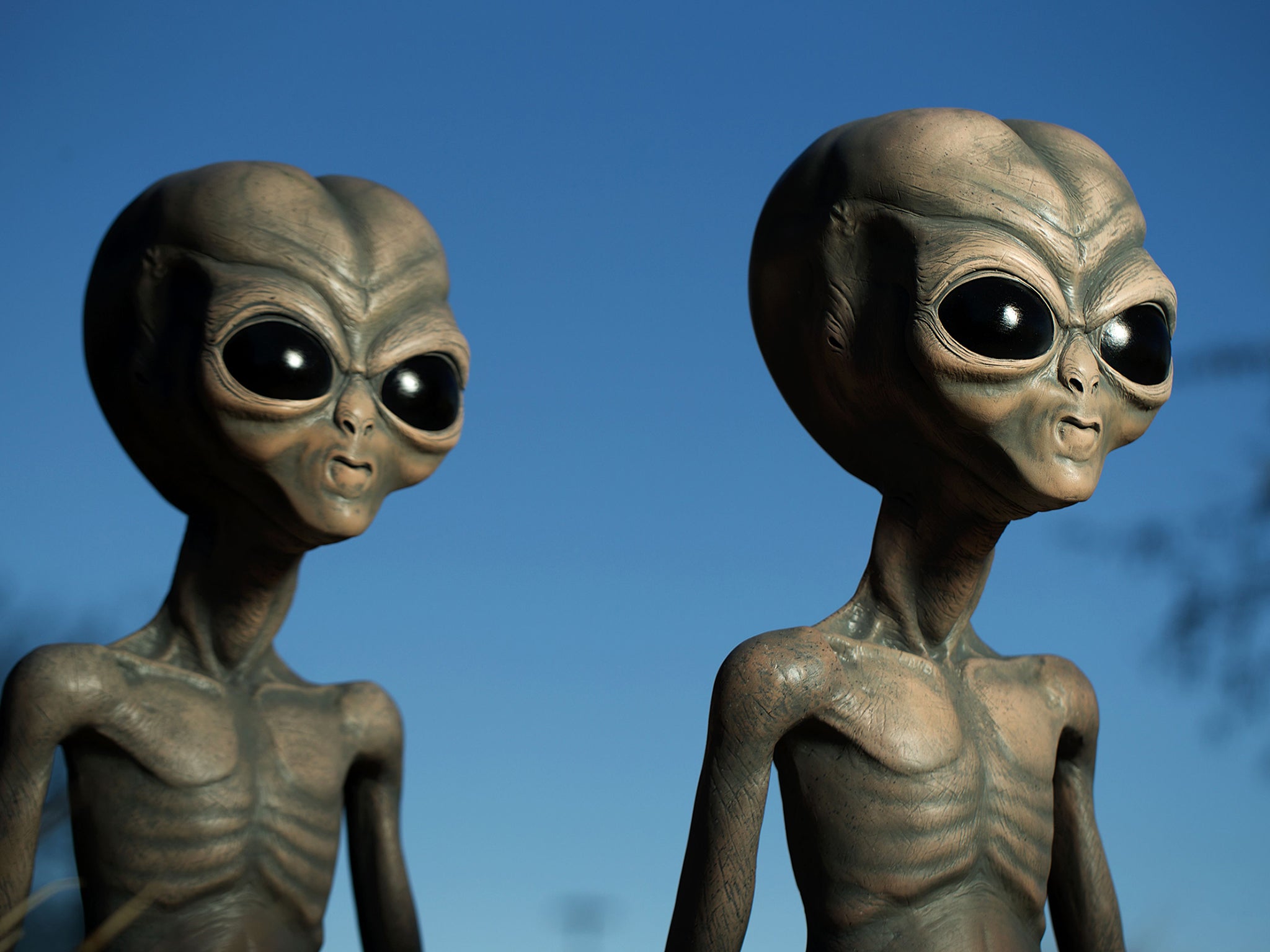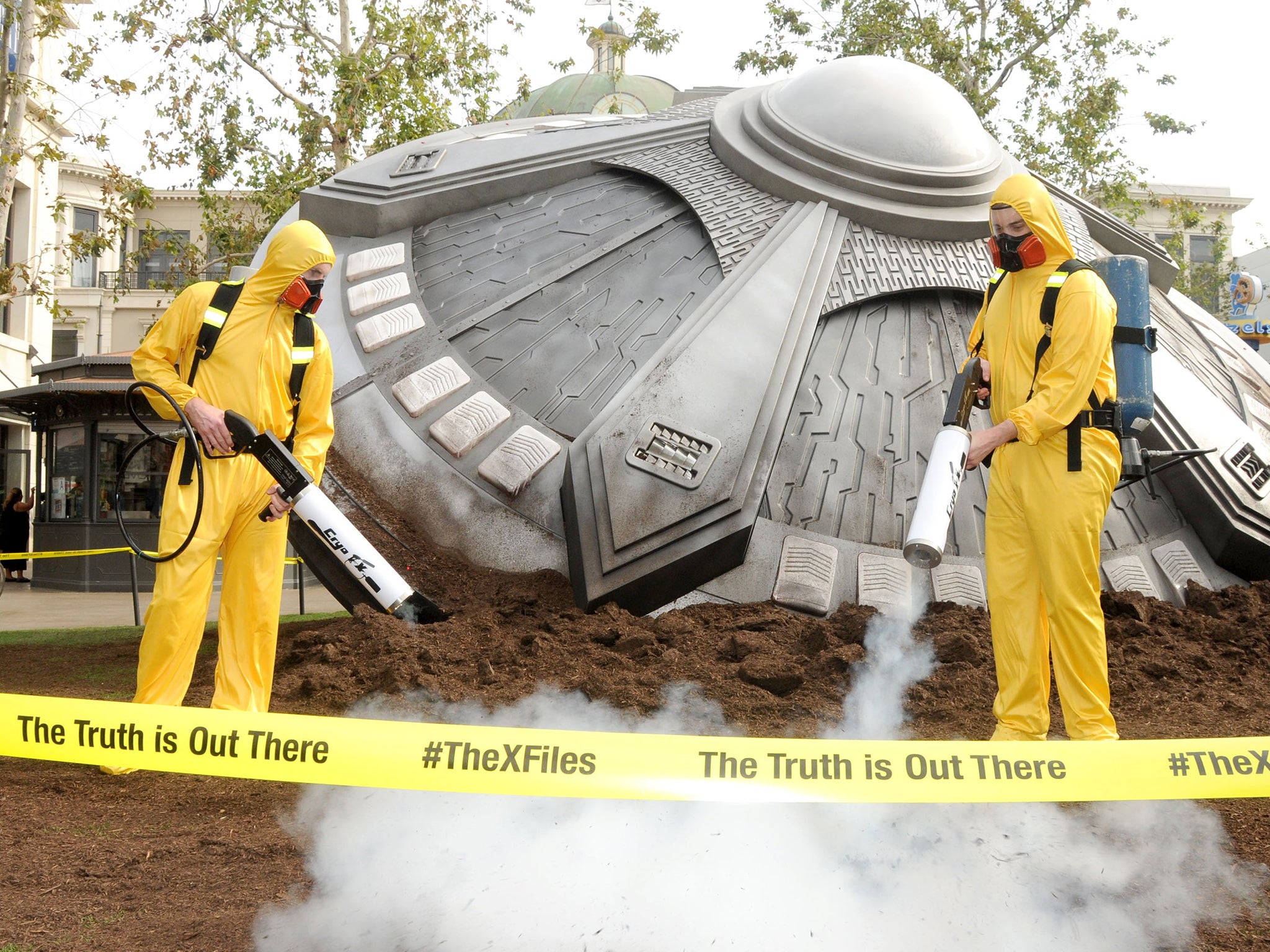World UFO Day: There’s life out there but it will not be what you think
Comedian Ben Miller explores the possibility of extra-terrestrial life forms in his new book ‘The Aliens Are Coming!’. If there is life out there, it’s going to be in bacterial or primitive form, he suggests. David Barnett talks to Miller and meets some of the experts searching for UFOs

I am sitting in the University of Huddersfield facing a large crowd of people who have come to listen to Ben Miller, the comedian and writer, speak. He has been talking about his latest book and, as moderator and interviewer, I am facilitating questions from the audience.
One woman has not so much a question, but a statement of fact. She saw, she says, what can only possibly have been an alien spaceship passing over the West Yorkshire town. Possibly on its way to the bright lights of Leeds, I can only surmise.
Miller, known for his sketch shows with comedy partner Alexander Armstrong and sitcoms such as I Want My Wife Back is, however, not playing this one for laughs. At this literary festival event he suggests that there are all kinds of rational explanations for what the lady in the audience saw, and probably none of them are that it was a spacecraft of extraterrestrial origin.
The woman folds her arms and fixes him with that particular Yorkshire stare that made the Lancastrians quake in their boots at the Battle of Towton. “I know what I saw,” she says resolutely.
And in a way, it’s Ben Miller’s own fault. His book is called The Aliens Are Coming!, after all, and it features a trio of B-movie flying saucers on the cover. It is billed as “the exciting and extraordinary science behind our search for life in the universe”.
And that’s not wrong. But it turns out Miller isn’t just about the comedy. He studied at Cambridge for a PhD in solid state physics and his book is indeed extraordinary and exciting. However, what it definitely doesn’t do is offer much succour to those who, like David Duchovny’s Fox Mulder in The X-Files, desperately Want To Believe not only in the existence of intelligent life on other planets, but also in the fact that they’re regularly visiting us.
Instead, Miller’s book suggests that if there is life out there, it’s going to be in bacterial or primitive form – and to back up his theories he uses some quite incredible examples of how life on earth has flourished in the most unlikely and unforgiving environments.
It’s food for thought but, to be honest, it’s not exactly little green men with ray guns, is it? And while our heads – and an increasing number of scientists – might tell us that Miller is on the right track, our hearts continue to declare that “The Truth is Out There”.
And never more so than today, which you will of course know is World UFO Day, celebrated annually since 2001 and according to its website, aiming “to raise awareness about the undoubted existence of UFOs and with that intelligent beings from outer space.”
One thing the World UFO Day people are not is po-faced. They have some ideas on their website about how you can celebrate today, including making your own UFO t-shirts, taking pictures of strange objects in the sky (hey, if it’s going to happen on any day…) and throwing a UFO spotting party. It’s all rather jolly and has a bit of a Eurovision “guilty pleasure” vibe to it – though the exhortation to “create original-looking UFOs out of frisbees” doesn’t seem quite to be in the spirit of proving beyond a doubt the existence of alien life-forms.

It also brings to mind the ill-fated revellers who welcomed the UFOs in the first Independence Day movie in 1996 – you know, the ones who gathered on top of skyscrapers with homemade posters saying things like “We are your friends” and were the first to be fried by the death-ray. But the Independence Day aliens are back in our multiplexes, of course – blowing London to smithereens and putting Jeff Goldblum through the wringer – and that doesn’t seem to be an accident; there appears to be an appetite for tabloid UFO stories like never before.
The internet has revitalised our interest in UFOs, perhaps, because who can resist a link that offers up a picture of a squashed bluebottle on a car windscreen with some clickbait headline questioning if this is not, finally, incontrovertible proof that the aliens are among us? Certainly the Express, Mirror and Mail seem particularly fond of UFO stories at the moment. Some sample headlines from the last week alone: “Is this a crashing UFO captured on camera?”; “Is this the secret military base where bodies of aliens were taken?”; “Alien hunter ‘blown away’ by fleet of UFOs flying around volcano”; “Has a UFO been spotted leaving Saturn?” And those are just from the Express, as is the simple but effective: “Aliens took me to Durham”.
A journalist on one of those newspapers, who shall remain unidentified lest he get a visit from the Men In Black who turn up to silence flying saucer witnesses, confirms their popularity: “X-Filesy stuff, Large Hadron Collider-y, quantum weirdness etc, etc will always go down well for us”. And while we might roll our eyes at the space given, online at least, to such oddball stories, it’s also true that they wouldn’t be running them were we not clicking on them in our thousands.
“The tabloids present them just as mysteries, there’s no attempt to investigate them,” says Heather Dixon. (Investigation is her thing; she is head of the national investigations committee at BUFORA – the British UFO Research Association.) “And there’s nothing wrong with that, we all love a good mystery. The problem is that for most people aliens are the modern-day equivalent of fairies and leprechauns.”
BUFORA has been running since 1962 and, although it is staffed entirely by volunteers, it brings a scientific and uncompromising rigour to its investigations. T-shirts and pimped frisbees are not its thing. “We conduct very robust research,” says Dixon. “These days we get a lot of visual reports – photos and videos from people’s phones. But most of it can be explained away; in fact I’d say 98 per cent of sightings have a rational explanation.” It’s that two percent that fascinates us, though. And, like Fox Mulder, we want to believe. “What I call the human factor is very strong in sightings,” says Dixon. People want to believe in UFOs. We are human, we all have our beliefs.”
Of course, the search for aliens is by no means limited to tabloid clickbait and enthusiastic amateurs. Last year the Breakthrough Initiatives was launched by the Russian billionaire Yuri Milner, a $100m (£75m) project to use the most powerful radio telescopes on the planet to “mine” the galaxy for specific clues suggesting the existence of other life-forms. Part of this is a competition to come up with a message to be sent out across the cosmos to represent the whole of humanity. And among entrants will be the Future of Humanity Institute (FHI) at the University of Oxford, which has links with the group of British astronomers and scientists who make up the UK research network arm of SETI – the Search for Extraterrestrial Intelligence.
The network is entering the competition to provide a message, but Anders Sandberg, of FHI and SETI, says quite seriously that there has been a lot of concern among members about doing so – because we might actually be waving a flag at intergalactic neighbours who might not have given us much thought before. “The cliche of being invaded by aliens was not really on our minds,” says Sandberg. “But the thinking was that the silence in the skies might be because alien civilisations are hiding from us, and that it might be stupid to attract attention.”

Ben Miller is all for making the first move. In fact, he thinks we should be doing more than sending out a simple message proclaiming “We come in peace for all mankind” or similar; we should send them the entire internet. “The first thing the aliens will want to do is work out whether there might be any information in our message,” he says, “and to do that they will need a lot of data.”
He tells the Huddersfield audience a story about a man who discovered microbes in hot pools of water in Wyoming’s Yellowstone National Park. Not very sexy to the committed UFO watcher, perhaps, but the point was microbes shouldn’t have been able to survive in the 90°C heat, in fact, anything above about 60°C and they check out. If life can thrive where it’s not meant to here on Earth, then that gives us hope that somewhere out there in the universe there’s single-celled life, says Miller. And if it’s as widespread as we believe it is, “complex intelligent life won’t be far behind.”
How far behind is up for discussion; if bacteria is all there is, we might have to wait a few billion years until they’ve evolved enough for us to say “hello”. But for those of us who have seen bright lights across the sky and been unable to explain them, the mysteries of the universe are already here (if tantalisingly out of reach). Our appetite for believing in UFOs shows no signs of abating. And while Ben Miller is dubious about the existence of little green men, he does think that we’ll find evidence of extraterrestrial life in some form in the next ten years. It’s just that to understand it, we might have to get a better grip on the miracle of life right here on Earth.
Join our commenting forum
Join thought-provoking conversations, follow other Independent readers and see their replies
Comments